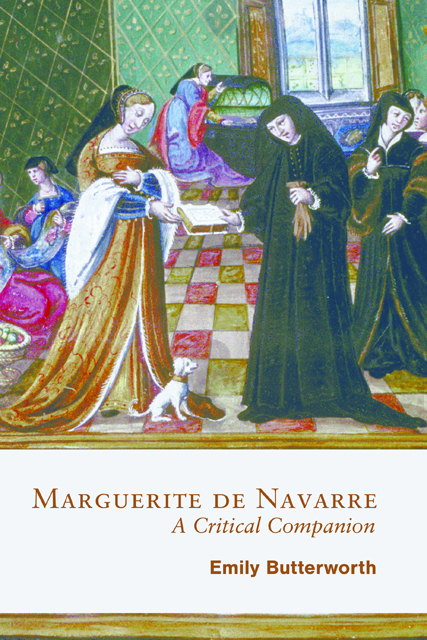Book contents
- Frontmatter
- Dedication
- Contents
- List of Illustrations
- Acknowledgements
- Note on Names and Editions
- Editions of Reference
- Introduction: A Brief Literary and Historical Chronology
- 1 Communities
- 2 Religion
- 3 Politics
- 4 Women and Men
- 5 Desire
- 6 Form and Technique
- Conclusion: Print and Public
- Bibliography
- Index
3 - Politics
Published online by Cambridge University Press: 20 December 2023
- Frontmatter
- Dedication
- Contents
- List of Illustrations
- Acknowledgements
- Note on Names and Editions
- Editions of Reference
- Introduction: A Brief Literary and Historical Chronology
- 1 Communities
- 2 Religion
- 3 Politics
- 4 Women and Men
- 5 Desire
- 6 Form and Technique
- Conclusion: Print and Public
- Bibliography
- Index
Summary
Marguerite de Navarre was a stateswoman and a diplomat as well as a poet. As trusted advisor to François I, she influenced French religious and foreign policy; she also controlled considerable territories in her own right when, in 1517, François made her duchess of Berry, at the same time promoting the duchy to the status of duché-pairie or ducal peerage. She thus became one of very few women peers of the realm and a powerful broker and patron, corresponding with diplomats, popes, humanists, and heads of state. A picture of how her political activities informed and influenced her writing is emerging from the work of historians and literary critics. Barbara Stephenson has studied her correspondence for evidence of how she managed her extensive patronage networks; Elizabeth Zegura has argued that the Heptameron is a political text in the mould of the ‘mirror for princes’, a political manual whose stories demonstrate to her brother how to govern. Jonathan Reid sees a continuity between Marguerite’s political activities and her literary work, both of which demanded consummate control, management, and presentation.
This chapter considers the political side of Marguerite’s writing, which – given the interconnection between politics and religion in the period – was often inseparable from the religious questions we considered in the previous chapter. I explore Marguerite’s involvement in international politics through letters related to her brother’s imprisonment in Spain. Then, I turn more generally to the gendered constraints and obligations that controlled sixteenth-century women’s political activity before examining the diplomatic virtues and practices evident in Marguerite’s correspondence and the accounts of foreign diplomats.
Finally, I consider how these practices are deployed in the Heptameron and its treatment of political issues such as governance, authority, and justice.
Marguerite in Madrid
The Battle of Pavia in 1525 was a disaster for France. This battle was part of the long-running Italian Wars which François had inherited from his predecessors, fought between France, Spain, and Italian states over Italian territories. From the start of his reign, François was an enthusiastic soldier: one of his first actions as sovereign was to leave the kingdom under the regency of his mother, in order to fight in Italy. The Battle of Marignano in September 1515 was an unusual victory for France and delivered the city of Milan temporarily to François.
- Type
- Chapter
- Information
- Marguerite de NavarreA Critical Companion, pp. 75 - 102Publisher: Boydell & BrewerPrint publication year: 2022

